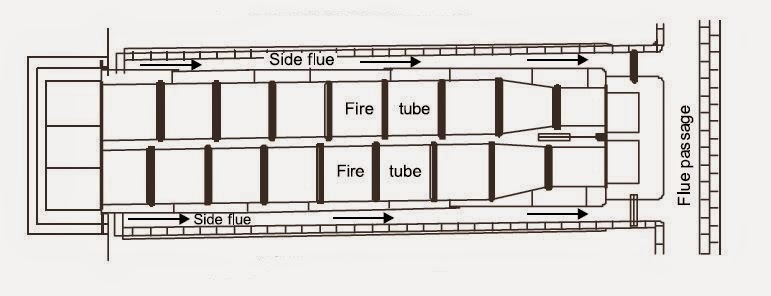Lancashire Boiler :-Lancashire Boiler is a stationary,fire tube,internally fired, horizontal and natural circulation boiler. Lancashire boilers are reliable and bear over load. They are economical within their operating capacity. However, they are bulky and initially raise steam very slowly. Working pressure in lancashire boilers are in the range of 0.7 MPa to 2 MPa and efficiency of the boiler is about 65%–70%. Size of these boiler depends upon size of shell which may be 2 m to 3 m in diameter and 6m to 10m in length.



Construction of Lancashire Boiler
Cylindrical shell
Lancashire Boiler consists of a horizontal cylindrical shell of 1.75m to 2.75m diameter. Its length varies from 7.25m to 9m. It is partly filled up with water. The water level inside the shell is above the furnace tubes.
Dampers
Dampers is fitted at the end of side flues to control the draught (rate of flow of air) and thus regulate the rate of generation of steam. These dampers are operated by chain passing over a pulley on the front of the boiler.
Fire bridge
Fire bridge is provided to prevent fuel from falling over the end of furnace. Fire bridge also helps in producing a better mixture of air and gases for perfect combustion by partly enveloping the combustion space.
Grate
The fire grate is provided at one end of the flue tubes on which solid fuel is burnt (where combustion of coal takes place).
Furnace tubes, bottom flue and side flues
Lancashire Boiler consists of two internal flue tubes having diameter about 0.4 times that of shell.The flues are built-up of ordinary brick lined with fire bricks. One bottom flue and two side flues are formed by brick setting, as shown in the figure.
Blow off cock
It is used for Removing mud etc., that settles down at the bottom of the boiler, by forcing out some of the water. It is also used to empty water in the boiler.
Working of Lancashire Boiler
In Lancashire Boiler first coal is fed on the grate where combustion of coal takes place.The Flue gases pass through the internal flue tubes and then pass downwards. The flue gases travels through the bottom flue to the front of the boiler. Then they are split up into two steams and flow through the side flues to the rear end of the boiler.Flue gases then pass through the dampers into the main flue and are finally discharged through the chimney into the atmosphere. The heat of flue gases is transferred to the water to generate steam.
No comments:
Post a Comment